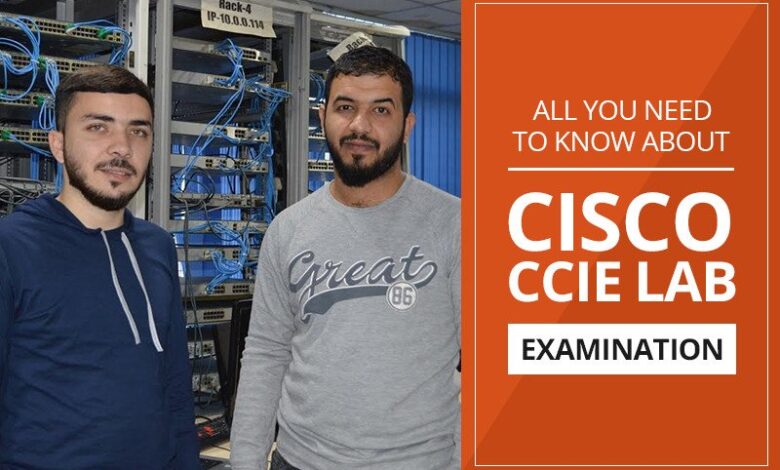What is the CCIE lab exam like?

Are you thinking of becoming a ccie enterprise infrastructure lab exam (CCIE)? Congratulations! You are on the path to one of the most prestigious certifications in the networking industry. However, before you can hold this title, you must pass the CCIE lab exam. This is no easy feat and requires extensive preparation and knowledge. In this blog post, we will explore what exactly the CCIE lab exam is like, its format, topics covered, as well as tips on how to prepare for it and succeed. So sit back, grab a cup of coffee or tea, and let’s dive into the world of CCIE certification!
What is the CCIE lab exam?
The CCIE lab exam is a practical test that assesses your ability to configure, troubleshoot and optimize complex networks. This exam requires hands-on experience with Cisco devices, as well as in-depth knowledge of various networking concepts and protocols.
To take the CCIE lab exam, you must first pass the written qualification exam. After passing this stage, you will be eligible to schedule your CCIE lab exam. The lab exam takes place over eight hours and consists of multiple scenarios that mimic real-world network problems.
During the CCIE lab exam, you will have access to a wide range of Cisco equipment and software tools necessary for configuring various network topologies. You are required to resolve all issues presented in each scenario within the allotted time frame.
The successful completion of the CCIE lab exam demonstrates not only technical expertise but also troubleshooting skills under pressure. Passing this certification proves that you have what it takes to design, deploy, manage and maintain sophisticated enterprise-level networks – an accomplishment worth striving for!
What is the format of the CCIE lab exam?
The CCIE lab exam is one of the most challenging and respected certifications in the IT industry. It tests an individual’s ability to design, implement, operate, and troubleshoot complex enterprise networks. The CCIE lab exam format consists of a hands-on practical examination that lasts for eight hours.
The exam comprises three modules: troubleshooting, diagnostic, and configuration. Each module focuses on different aspects of network design and operation. The troubleshooting module requires candidates to identify and fix network issues within a limited time frame.
In contrast, the diagnostic module involves identifying problems based on given symptoms without access to routers or switches’ command-line interface (CLI). The configuration module requires applicants to configure various parts of a large-scale network topology according to specific requirements provided by Cisco.
To pass this certification successfully requires significant hands-on experience with enterprise-level networking systems as well as extensive theoretical knowledge in routing protocols such as OSPF or BGP. Aspiring candidates should be able to work under pressure while maintaining accuracy throughout all stages of the examination process.
What are the topics covered on the CCIE lab exam?
The CCIE lab exam covers a wide range of topics related to networking and technology. The exam is designed to test the proficiency of candidates in different areas, including routing and switching, security, collaboration, data center, wireless networks, and service provider technologies.
In the routing and switching section of the exam, candidates are tested on their ability to configure complex network topologies using various protocols such as OSPF, EIGRP or BGP. They must also demonstrate an understanding of IPv6 addressing schemes.
The security section tests examinees’ knowledge about VPN configurations -site-to-site VPNs- firewalls configuration with ASA appliances along with intrusion prevention systems (IPS). Also included in this area are cryptography concepts that include encryption methods like AES-256 bit keys.
In the collaboration section; Candidates will be tested on their abilities regarding VoIP systems which includes Call Manager administration skills alongside UCCE/UCCH setup procedures for Contact Center solutions. Skills on Cisco WebEx Meetings Server configuration may also be assessed here
Data center questions cover a range of topics from implementing virtualization techniques across multiple data centers locations to configuring storage arrays for iSCSI/NFS targets implementation through Fabric Interconnect modules.
Wireless Networks focus on core principles like SSID Configurations AP Connectivity via WLC controllers while Service Provider Technologies deals with MPLS/VRF/BGP/LDP troubleshooting among other scheme integrations within carrier-grade infrastructure.
Preparing comprehensively by getting all-round knowledge is important before taking any CCIE Lab Exam sections.
How to prepare for the CCIE lab exam
Preparing for the CCIE lab exam can be a daunting task, but with proper planning and execution, you can increase your chances of success. Here are some tips to help you prepare for the CCIE lab exam:
Create a study plan that includes all the topics covered in the exam. Allocate enough time for each topic and make sure to revise regularly. This will ensure that you have covered everything before taking on the actual test.
Practice is key when it comes to passing this exam. Set up a home lab or use virtual labs available online and practice as much as possible. This will help you get comfortable with different scenarios that may arise during the actual test.
Join study groups or forums where you can interact with other candidates who are also preparing for the same exam. You’ll learn from their experiences and gain valuable insights into what to expect during the actual test.
Fourthly, take mock exams under timed conditions so that you’re able to simulate real-life situations during testing conditions. Analyze your performance after every mock test and work on areas where improvements are needed.
Stay focused and motivated throughout your preparation journey because it takes determination and hard work to succeed in this challenging certification process!
Tips for taking the CCIE lab exam
Taking the CCIE lab exam can be a daunting experience, but with the right preparation and mindset, you can increase your chances of success. Here are some tips to help you navigate this challenging exam:
1. Time management is key
The CCIE lab exam is timed, so it’s important to manage your time effectively. Make sure you allocate enough time for each section and don’t spend too long on any one task.
2. Read the instructions carefully
Make sure you read all instructions carefully before starting each section of the exam. This will help ensure that you understand what is expected of you before beginning any tasks.
3. Stay focused
It’s easy to get distracted during such a long and intense exam, but staying focused is crucial if you want to do well. Try taking short breaks when needed, but make sure not to lose momentum or focus.
4. Practice makes perfect
One of the best ways to prepare for the CCIE lab exam is by practicing beforehand as much as possible. This will give you an idea of what types of questions might be asked and how they are structured.
5. Don’t panic!
Remember that nerves can often get in the way during exams like these – however try not to let them take over! Take deep breaths if necessary and remind yourself that with practice and preparation, it’s possible to pass this difficult test!
Conclusion
The CCIE lab exam is a challenging test that requires extensive knowledge and practical skills in networking. It is designed to assess your ability to implement complex network solutions in real-world scenarios click this link: www.spotoclub.com.
To pass this exam, you need to have a solid understanding of the topics covered on the test, as well as hands-on experience working with Cisco devices. You should also prepare yourself mentally for the pressure and time constraints of this intensive testing environment.
By following these tips and putting in enough preparation time, you can increase your chances of success on the CCIE lab exam. Remember that passing this certification will not only advance your career but also demonstrate your competence and expertise in networking to potential employers.
So go ahead and take on this challenge with confidence! With determination, hard work and dedication towards achieving excellence in networking technology, anyone can succeed at becoming a certified CCIE professional.



